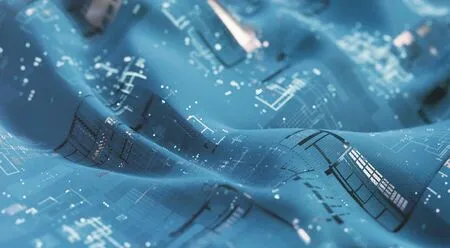Technology builds smart textiles to aid the interaction between connected devices and the human body

Technological advancement builds intelligent textiles to aid the interaction between connected devices and the human body.Smart clothes use a variety of IoT sensors to collect the person’s biometric and physical data for effective health and activity monitoring.Also, textile manufacturers incorporate microelectronics, biotechnology, and nanomaterials to improve the interconnection between components.Besides that,startups are working on durable sensors that withstand multiple washes.This way, the startups offer tech-driven resilient solutions that regulate the human body and protect against environmental hazards.
Dimpora is an award-winning materials start-up that reconciles performance clothing and sustainability by developing non-toxic (PFAS-free, DMF-free),waterproof, and highly breathable membranes.A fully biodegradable option is under development.
This 2D product involves a conventional lamination of the dimpora membrane onto a textile.The waterproof fluorine-free membrane is mainly based on polyurethane and undergoes our template removal approach to create the necessary porosity, thus achieving excellent breathability.dimpora eco pur?membrane provides a solution to move away from old chemicals and processes without compromising its performance.
The sane membrane? is extremely waterproof, you will stay dry even in the most extreme weather conditions.Combined with high breathability, this is the optimal membrane for long periods in the harshest conditions.The waterproof fluorine-free membrane is mainly based on polypropylene.
Hungarian startup Alpha Femtech creates smart menstrual clothing to ease period pain.The startup’s proprietary smart bodywear ARTEMIS produces microvibrations to regulate heat release to the body.Further,the bodysuit is connected to the app, which regulates the intensity of pain relief.The app also collects personalized data for later analysis with gynecologists.
German startup MotoSkins offers robotic fabrics with embedded fluidics to improve circulation in the human body.The technology borrows the concept of plants’ hygroscopic movement.The resulting product harvests the potential energy from each user’s step to power the next one.Further, the wearable garment uses energy to produce dynamic massage.This way, MotorSkins produces soft exoskeletons that function as external muscles to enhance people’s autonomy with walking difficulties.
- China Textile的其它文章
- The global fire-resistant fabrics market is anticipated to garner US$ 6 billion in 2033
- AI and data analytics are in full swing in the textile sector
- Desalting? Reversible dyeing? Dyeing and printing industry ushers in big changes!
- The Innovation of Global Start-ups from ITMA 2023
- FISH’s new technology makes the management of textile enterprises smarter
- Maredamare 2023: The international beachwear show

